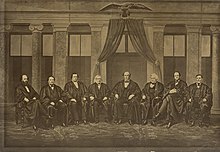|
Crandall v. Nevada
Crandall v. Nevada, 73 U.S. (6 Wall.) 35 (1868), was a landmark decision of the US Supreme Court that affirmed that a state cannot inhibit people from leaving the state by taxing them.[1] The decision was written by Justice Miller. Chief Justice Chase and Justice Clifford concurred. BackgroundIn 1867, a Nevada statute imposed a $1 tax on every person leaving the state by railroad, stage coach, or other vehicles engaged or employed in the business of transporting passengers for hire. Questions Raised
Majority Opinion The Court reasoned that the right to travel is a fundamental right. The people of the United States constituting one nation, a State may not impose a tax on a person for the "privilege" of traveling from or for passing through it. The Court stated that a person traveling is different from the transportation of a good, which prevents imposts or duties on a person. The tax was not a prohibited impost, and precedent from Cooley v. Board of Wardens[2] was cited to show that a tax "does not itself institute any regulation of commerce of a national character...." The Court also used precedent from McCulloch v. Maryland[3] to show it is the very presence of the tax that is unconstitutional, not how much of a burden it is: "But if the government has these rights on her own account, the citizen also has correlative rights. He has the right to come to the seat of the government... this right is in its nature independent of the will of any State over whose soil he must pass in the exercise of it." Concurring OpinionsChief Justice Chase and Justice Clifford concurred by basing their reasoning on the Commerce Clause of the Constitution. They claimed that the tax impeded interstate commerce. See alsoReferences
External links
|
||||||||||||||||||||||||||||||
Portal di Ensiklopedia Dunia
